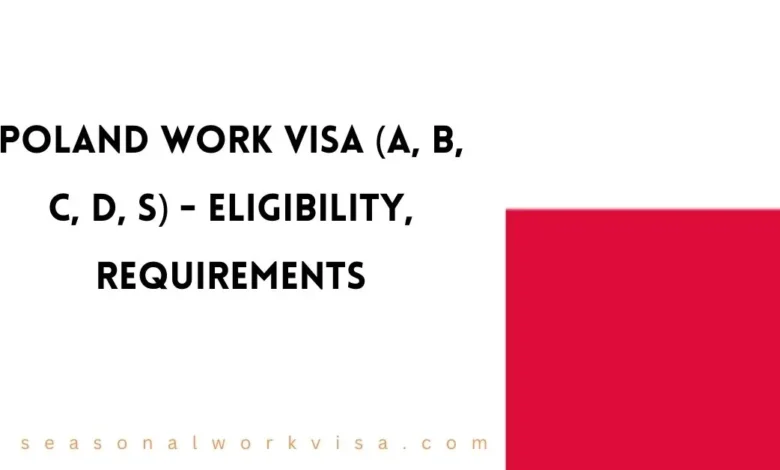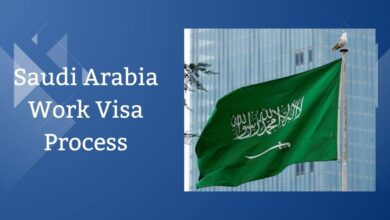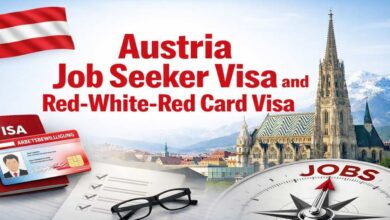Poland Work VISA (A, B, C, D, S) – Eligibility, Requirements

Poland has become an increasingly attractive destination for workers from all over the world, thanks to its growing economy, vibrant job market, and quality of life. If you’re planning to move to Poland for work, it’s important to understand the specific documents required for your visa, as well as the eligibility criteria.
This guide will walk you through the essential steps to help you successfully navigate the visa application process.
General Eligibility Criteria for a Polish Work Visa:
No matter what type of visa you apply for, you must meet the following general requirements to work legally in Poland:
- Job Offer: You must have a valid job offer from a Polish employer. This is the foundation of your visa application.
- Work Permit: In most cases, your employer needs to obtain a work permit on your behalf. The work permit process often includes proving that no qualified Polish or EU citizens are available for the position. This may involve a job market test.
- Valid Passport: You must have a passport that remains valid for at least three to six months after your planned stay in Poland.
- Proof of Financial Means: You must demonstrate that you have sufficient financial resources to support yourself during your stay in Poland. This could include bank statements, proof of employment, or other financial documentation.
- Health Insurance: Health insurance that covers your entire stay in Poland is essential. Ensure that your policy meets the minimum required coverage, which is generally around €30,000 for medical emergencies.
Benefits:
Poland offers a variety of advantages for foreign workers. Some of the key benefits include:
- Access to the European Union (EU): As a member of the EU, Poland provides workers with the opportunity to move and work freely within other EU countries, expanding job prospects across the region.
- Competitive Salaries: While salaries in Poland are generally lower than in Western Europe, they are competitive within Eastern Europe. Industries such as technology, engineering, finance, and healthcare offer higher salaries, and the overall cost of living is lower, making Poland an attractive destination for many professionals.
- A Growing Job Market: Poland’s economy is stable and diverse, with strong sectors in IT, manufacturing, finance, healthcare, and engineering. The Polish labor market has seen continuous growth, particularly in urban areas like Warsaw, Kraków, and Wrocław.
- High Quality of Life: Poland offers a high quality of life, with modern amenities, efficient public services, and a relatively affordable cost of living. Cities are well-connected, and public transportation is both accessible and reliable.
- Work-Life Balance: Poland is known for promoting a healthy work-life balance, with reasonable working hours, generous vacation time, and numerous public holidays. This contributes to a strong sense of well-being among employees.
- Social Benefits: Employees in Poland are entitled to social benefits, including health insurance, paid leave, and pension contributions. These benefits are a key part of Poland’s social security system, which ensures financial stability and access to medical care.
- Career Development Opportunities: Poland has a growing number of multinational companies, offering career advancement opportunities and professional development programs. This is particularly true for sectors such as technology and finance.
- Family Relocation: Polish work visas often allow visa holders to bring their families along, ensuring that spouses and children can also live and work in Poland. This is especially helpful for workers planning to relocate long-term.
- Affordable Cost of Living: Poland offers a relatively low cost of living compared to many other European nations. Rent, utilities, and food costs are all affordable, making it an ideal choice for workers looking to live comfortably without breaking the bank.
Types of Poland Work Visas and Specific Eligibility Criteria:
Poland offers several types of work visas, each catering to different types of employment. Here’s an overview of the main visa types:
Type A Visa (Highly Qualified Worker):
This visa is for professionals who hold a degree and significant work experience, usually in a high-demand sector. Applicants must secure a job that offers a salary above a certain threshold, which is subject to change based on the industry.
Eligibility:
- A valid job offer in a high-demand field.
- Proof of qualifications (degree or certification) and relevant work experience.
Type B Visa (Seasonal Worker):
The Type B visa is designed for workers engaged in seasonal jobs such as agriculture, tourism, or hospitality. This visa is generally short-term, lasting only for the duration of the seasonal work.
Eligibility:
- A seasonal job offer from a Polish employer.
- Proof of employment and accommodation for the duration of your stay.
Type C Visa (Intra-Corporate Transfer):
This visa is for employees of multinational companies who are being transferred to a Polish branch. It is often used by managers, specialists, or executives who already work for an international company.
Eligibility:
- A transfer letter from the employer.
- Proof of your job position at the international company.
Type D Visa (Work Visa):
The Type D visa is the most common work visa for individuals seeking long-term employment in Poland. Applicants must have a job offer and meet other work permit requirements.
Eligibility:
- A valid job offer and work permit from a Polish employer.
- Proof of employment contract detailing job description and salary.
Type S Visa (Short-Stay Work Visa):
This visa is intended for those who will be working in Poland for a short-term project, typically lasting up to 90 days. This visa is often used by freelancers or contract workers.
Eligibility:
- A job offer for short-term work in Poland.
- An invitation letter from a Polish employer or company.
Document Requirements\:
The documents required for a Poland work visa depend on the visa type you are applying for. Here’s a breakdown:
Common Documents for All Types of Work Visas:
- Valid Passport: Must be valid for at least three months after your planned stay in Poland.
- Completed Visa Application Form: Available on the e-Konsulat website for online submission.
- Recent Passport-Sized Photos: Typically two passport photos in accordance with Polish specifications.
- Proof of Health Insurance: Your health insurance must cover medical expenses up to a minimum of €30,000.
- Proof of Accommodation: For many visa types, proof of accommodation is required. This can include a hotel reservation or rental agreement.
Additional Documents by Visa Type:
- Type A Visa (Highly Qualified Worker):
- Proof of qualifications (degree or certification).
- Proof of work experience.
- Salary verification from the employer.
- Type B Visa (Seasonal Worker):
- Job contract for seasonal work.
- Proof of accommodation for the duration of employment.
- Type C Visa (Intra-Corporate Transfer):
- Proof of employment with the international company.
- Letter of transfer.
- Position verification.
- Type D Visa (Work Visa):
- Employment contract.
- Work permit documentation.
- Type S Visa (Short-Stay Work Visa):
- Invitation letter from the employer.
- Proof of the duration of employment.
How to Apply for a Poland Work Visa?
Once you have gathered all the required documents, the next step is to apply for a work visa. Here’s how:
- Locate the Nearest Polish Embassy or Consulate: You can find the closest embassy or consulate using the e-Konsulat website. The website also allows you to book an appointment for your visa submission.
- Make a Visa Appointment: Schedule an appointment at the consulate or embassy. Be sure to do this well in advance, as processing times can vary.
- Submit Your Application: Bring your completed application form, supporting documents, and passport-sized photos to your appointment. You may also be required to attend a visa interview.
- Wait for Visa Processing: After submission, the embassy or consulate will process your application. Processing times can vary, but it typically takes several weeks, so plan ahead.
Conclusion:
Relocating to Poland for work can be a fantastic opportunity, but it requires careful planning and understanding of the visa process. This guide provides a comprehensive overview of the different work visas available, along with the documents required and steps for application. By following these guidelines and ensuring that you meet all the eligibility criteria, you’ll be well on your way to starting your new job in Poland in 2026.
Frequently Asked Questions:
Do I need a visa to work in Poland?
To work in Poland, you need a visa if you are not from the EU/EEA or Switzerland. An EU, EEA, or Swiss person can work in Poland for more than three months without having to do anything else. They just need to register for their stay at a local registration office. Registering your stay is not the same as applying for a visa. It is more of a way to let the Polish government know that you want to stay and work in Poland for longer.
How do I get a Poland work visa?
The company you work for applies for a work permit on your account.
At the Polish office, you can get a work visa.
Go to Poland and get to work.Is Poland giving visas to Pakistan?
The cost of a Schengen visa for Pakistani citizens in Poland. The total fee for Pakistani citizens that apply for a Schengen Visa via our services is USD $204.99.




